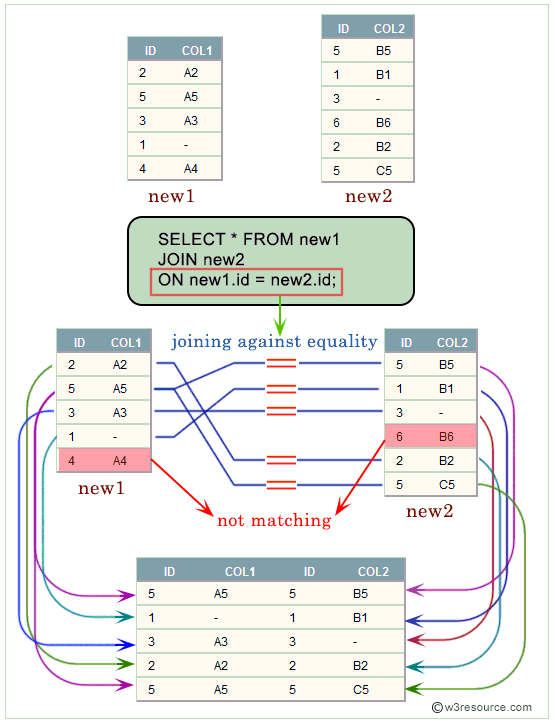Oracle EQUIJOINS
What is an Equijoin in Oracle?
An equijoin is such a join which performs against a join condition containing an equality operator. It combines rows of one table associated with one or more rows in another table based on the equality of column values or expressions.
Syntax:
SELECT column_list FROM table1, table2 WHERE table1.column_name = table2.column_name;
Pictorial presentation

Example-1:
Sample table: employees
Sample table: departments
The following examples return the first name and job of each employee and the number and name of the department in which the employee works.
SELECT first_name, job_id, departments.department_id, department_name
FROM employees, departments
WHERE employees.department_id = departments.department_id
ORDER BY last_name, job_id;
Sample Output:
FIRST_NAME JOB_ID DEPARTMENT_ID DEPARTMENT_NAME -------------------- ---------- ------------- -------------------- Ellen SA_REP 80 Sales Sundar SA_REP 80 Sales Mozhe ST_CLERK 50 Shipping David IT_PROG 60 IT Hermann PR_REP 70 Public Relations Shelli PU_CLERK 30 Purchasing Amit SA_REP 80 Sales Elizabeth SA_REP 80 Sales Sarah SH_CLERK 50 Shipping David SA_REP 80 Sales Laura ST_CLERK 50 Shipping Harrison SA_REP 80 Sales Alexis SH_CLERK 50 Shipping Anthony SH_CLERK 50 Shipping Gerald SA_MAN 80 Sales Nanette SA_REP 80 Sales .....................................
Example-2: Equijoins using AND , IN
The following SQL query returns the department no, department name and city of each location in which the department no containing the value 40 or 50.
Sample table: locations
Sample table: departments
SELECT a.department_id, a.department_name, b.city
FROM departments a, locations b
WHERE a.location_id = b.location_id
AND a.department_id IN (40, 50);
Sample Output:
DEPARTMENT_ID DEPARTMENT_NAME CITY
------------- ------------------------------ ---------------------
40 Human Resources London
50 Shipping South San Francisco
Example-3: Equijoins using more than two tables
The following SQL query returns the first name, department name, and city of each employee.
Sample table: employees
Sample table: locations
Sample table: departments
SELECT a.first_name, b.department_name, c.city
FROM employees a, departments b, locations c
WHERE a.department_id = b.department_id
AND b.location_id = c.location_id;
Sample Output:
FIRST_NAME DEPARTMENT_NAME CITY -------------------- ------------------------------ ---------------------- Ellen Sales Oxford Sundar Sales Oxford Mozhe Shipping South San Francisco David IT Southlake Hermann Public Relations Munich Shelli Purchasing Seattle Amit Sales Oxford Elizabeth Sales Oxford Sarah Shipping South San Francisco David Sales Oxford Laura Shipping South San Francisco Harrison Sales Oxford Alexis Shipping South San Francisco Anthony Shipping South San Francisco ..........
Previous:
Oracle JOINS
Next:
NON-EQUIJOINS
